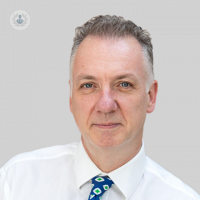Symptoms, diagnosis and treatment of Graves’ disease
Written by:Over activity of the thyroid gland, also known as hyperthyroidism or thyrotoxicosis, is due to an increased amount of thyroid hormones in the blood. There are several causes of this over-activity, but in practice more than 80% of cases are due to the gland being excessively stimulated by thyroid-stimulating antibodies. This condition is called Graves’ disease or toxic diffuse goitre. It is “toxic” because the person is usually ill as the body’s cells are being overstimulated by the increased circulating levels of thyroid hormones in the bloodstream.

The cause of Graves’ disease
An environmental factor, such as a viral infection or a stressful life event, is thought to trigger the immune system in those who are genetically susceptible. Often there is a genetic or hereditary factor because autoimmune diseases of the thyroid gland and other organs or tissues tend to run in families. Women at all ages are some ten times more likely than men to develop the condition and it rarely occurs in children.
What are the symptoms?
The condition usually comes on slowly and it may be several months before the person is ill. Typical symptoms include: tiredness, weakness (particularly in the upper muscles of the arms and legs), weight loss despite increased appetite, shortness of breath, heart palpitations, nervousness, irritability, trembling and sweating, looseness or increased urgency of the bowels and itchy skin. In approximately 20% of patients with Graves’ disease one or both eyes are affected. Women may notice that their periods become less heavy, less frequent or stop completely and men may experience loss of sex drive and erectile dysfunction.
What are the curative treatment options?
There are three main methods, not mutually exclusive, of treating Graves’ disease. These are:
1. Treatment by anti-thyroid drugs for 12 to 18 months - these suppress the ability of the thyroid gland to make thyroid hormones.
2. Use of radio-iodine which is concentrated on and destroys the thyroid cells.
3. Surgical removal of most of the thyroid gland (thyroidectomy). The decision as to which method to use depends on several factors and circumstances which must be discussed between the patient and their specialist. The most important of these are: age, gender, the size of the thyroid gland, whether it is cosmetically unsightly, or whether it is causing compression or displacement of the trachea (windpipe), the position of the thyroid gland behind the sternum, social considerations, presence and severity of any eye complications, previous treatments that have been given for the condition.
What are the non-curative treatment options?
There are two forms of treatment available that will improve symptoms but which will not permanently cure the overactive thyroid.
1. Beta-blockers - for example propanolol and atenolol - which reduce the effects of excess thyroid hormone on the nervous system. They reduce sweating; anxiety and restlessness; palpitations and heart rate; and can make people feel more comfortable until a proper cure can be achieved. In general these are very safe drugs but they are to be avoided in people with a history of asthma.
2. Iodine has a temporary suppressive effect on the thyroid gland as it blocks the release of thyroid hormones - but this effect lasts for only three to four weeks.


